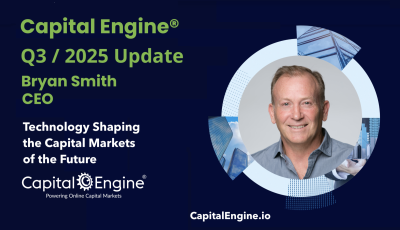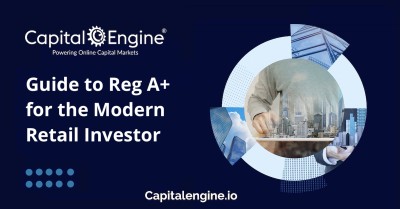SHOULD YOUR RETIREMENT PORTFOLIO INCLUDE PRIVATE EQUITY OR EQUITY CROWDFUNDING?

SHOULD YOUR RETIREMENT PORTFOLIO INCLUDE PRIVATE EQUITY OR EQUITY CROWDFUNDING?
Jul 20, 2020
Posted by Jasmin Sethi - Forbes
This year has brought a regulatory push to expand opportunities for ordinary investors to invest in asset classes that have been historically restricted to the wealthy and financially sophisticated. Three areas of greater inclusion being considered by regulators are access to private equity, crowdfunding, and leveraged ETFs. Out of these three – only one – namely private equity – is grounded in investment principles that support more widespread investment by ordinary individuals saving for retirement.
In a trend towards deregulating restrictions on ordinary investors, the SEC has released a series of rule proposals designed to provide investors with greater access to certain asset classes that have been restricted to date.
First, in January, the SEC proposed making it easier for fund sponsors to launch leveraged ETFs that maintain a leverage level below 300% by allowing them to skip the rule filing process. While the proposal would require brokers to approve their customers’ accounts to engage in the buying or selling of leveraged ETF shares on self-directed brokerage accounts – a new requirement – the proposal overall could make leveraged ETFs a more mainstream product.
While these products may be useful for a subset of investors, they are not well understood and present a lot of risks to ordinary investors who may not understand how these ETFs compute leverage on a daily basis.
In January, the SEC also proposed loosening the definition of accredited investors to include knowledge as another proxy for financial sophistication. Currently, individuals who have a net worth exceeding $1 million or individuals who had an income in excess of $200,000 in each of the two most recent years, qualify to invest in private securities.
The proposed rule would allow individuals who meet certain knowledge criteria to invest in private securities, including private equity, irrespective of their wealth, based on their ability to assess an investment opportunity. If the definition of accredited investor is liberalized, private equity funds could be more broadly held within brokerage accounts, including IRA accounts.
Changes made to the definition of accredited investors, along with recent guidance from the DOL, would pave the way to make private equity more broadly available within retirement plans, such as 401(k) accounts.
In another move towards greater access for investors in March, the SEC proposed to allow increased access to crowdfunding. The timing of this proposal was particularly significant as equity crowdfunding may be getting more traction in the current pandemic environment.
While supporting small businesses and start-ups may have emotional appeal because of the impact of COVID-19 on the economy, it is not a good time for most investors to put too much of their net worth (already unstable during these times) into an undiversified, highly illiquid investment opportunity.
Crowdfunding Investment Limits
As can be seen from this table, access to equity crowdfunding will be liberalized for everyone, and may be particularly impactful for Group A. Like private equity, crowdfunding investment opportunities are also unlikely to be correlated with the public markets.
However, unlike private equity funds, any one crowdfunding raise is an undiversified investment. Further, it is riskier than investing in a single public stock given the lack of liquidity and early stage of the company. Group A investors, in particular, are unlike angel investors who are able to diversify their risk by investing in funds of start-ups, e.g., angel access funds or in a number of start-ups – a luxury that most ordinary investors, particularly those in Group A above, would not have.
Indeed, angel investors who diversify increase their median returns per year by 9.0 basis points and mean returns per year by 6.9 basis points for each additional company to which a limited partner is exposed.
Read more ...
About Capital Engine Powering Online Capital Markets®
Capital Engine® is a financial technology company, providing investment professionals and advisors (Broker Dealers, Family Offices, Wealth Managers, Incubators, Accelerators, RIAs, GP/LPs and real estate funds) with customized SaaS solutions to power private label capital and alternative investment platforms, with a strong focus on investor management services.
Capital Engine's software helps leverage the opportunity to better originate and showcase a diverse selection of private investment deals and offer these to investors (HNW, UHNW and Family Office) i.e. a deal’s potential viability can be better assessed, market appetite determined and transaction promptly closed.
Strategic Partnership Model
Our business model is to partner with industry experts in real estate, venture capital, healthcare, renewable energy, cannabis, impact funding and crypto projects, in setting up investment platforms, online marketplaces and trading exchanges using our software.
Online Marketplace
Our online marketplace is filling a massive gap in the US market in funding private capital markets and alternative investments: Reg D 506 (c) and Reg S (International) based real estate, venture capital, healthcare, renewable energy, social impact and crypto projects, with UK and South Africa platforms following soon.
Click for more info or to request an online demo
This year has brought a regulatory push to expand opportunities for ordinary investors to invest in asset classes that have been historically restricted to the wealthy and financially sophisticated. Three areas of greater inclusion being considered by regulators are access to private equity, crowdfunding, and leveraged ETFs. Out of these three – only one – namely private equity – is grounded in investment principles that support more widespread investment by ordinary individuals saving for retirement.
In a trend towards deregulating restrictions on ordinary investors, the SEC has released a series of rule proposals designed to provide investors with greater access to certain asset classes that have been restricted to date.
First, in January, the SEC proposed making it easier for fund sponsors to launch leveraged ETFs that maintain a leverage level below 300% by allowing them to skip the rule filing process. While the proposal would require brokers to approve their customers’ accounts to engage in the buying or selling of leveraged ETF shares on self-directed brokerage accounts – a new requirement – the proposal overall could make leveraged ETFs a more mainstream product.
While these products may be useful for a subset of investors, they are not well understood and present a lot of risks to ordinary investors who may not understand how these ETFs compute leverage on a daily basis.
In January, the SEC also proposed loosening the definition of accredited investors to include knowledge as another proxy for financial sophistication. Currently, individuals who have a net worth exceeding $1 million or individuals who had an income in excess of $200,000 in each of the two most recent years, qualify to invest in private securities.
The proposed rule would allow individuals who meet certain knowledge criteria to invest in private securities, including private equity, irrespective of their wealth, based on their ability to assess an investment opportunity. If the definition of accredited investor is liberalized, private equity funds could be more broadly held within brokerage accounts, including IRA accounts.
Changes made to the definition of accredited investors, along with recent guidance from the DOL, would pave the way to make private equity more broadly available within retirement plans, such as 401(k) accounts.
In another move towards greater access for investors in March, the SEC proposed to allow increased access to crowdfunding. The timing of this proposal was particularly significant as equity crowdfunding may be getting more traction in the current pandemic environment.
While supporting small businesses and start-ups may have emotional appeal because of the impact of COVID-19 on the economy, it is not a good time for most investors to put too much of their net worth (already unstable during these times) into an undiversified, highly illiquid investment opportunity.
Crowdfunding Investment Limits
| Group | Investment Limit Under Current Crowdfunding Rule | Investment Limit Under the SEC’s Proposal |
|---|---|---|
As can be seen from this table, access to equity crowdfunding will be liberalized for everyone, and may be particularly impactful for Group A. Like private equity, crowdfunding investment opportunities are also unlikely to be correlated with the public markets.
However, unlike private equity funds, any one crowdfunding raise is an undiversified investment. Further, it is riskier than investing in a single public stock given the lack of liquidity and early stage of the company. Group A investors, in particular, are unlike angel investors who are able to diversify their risk by investing in funds of start-ups, e.g., angel access funds or in a number of start-ups – a luxury that most ordinary investors, particularly those in Group A above, would not have.
Indeed, angel investors who diversify increase their median returns per year by 9.0 basis points and mean returns per year by 6.9 basis points for each additional company to which a limited partner is exposed.
Read more ...
About Capital Engine Powering Online Capital Markets®
Capital Engine® is a financial technology company, providing investment professionals and advisors (Broker Dealers, Family Offices, Wealth Managers, Incubators, Accelerators, RIAs, GP/LPs and real estate funds) with customized SaaS solutions to power private label capital and alternative investment platforms, with a strong focus on investor management services.
Capital Engine's software helps leverage the opportunity to better originate and showcase a diverse selection of private investment deals and offer these to investors (HNW, UHNW and Family Office) i.e. a deal’s potential viability can be better assessed, market appetite determined and transaction promptly closed.
Strategic Partnership Model
Our business model is to partner with industry experts in real estate, venture capital, healthcare, renewable energy, cannabis, impact funding and crypto projects, in setting up investment platforms, online marketplaces and trading exchanges using our software.
Online Marketplace
Our online marketplace is filling a massive gap in the US market in funding private capital markets and alternative investments: Reg D 506 (c) and Reg S (International) based real estate, venture capital, healthcare, renewable energy, social impact and crypto projects, with UK and South Africa platforms following soon.
Click for more info or to request an online demo
Latest Articles





